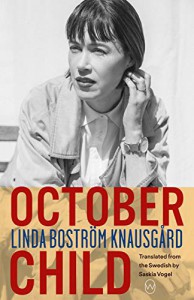This month, our selections of excellent works from around the world are manifold with mystery: some historical, some psychological, and some linguistic. From Poland, philosopher Remigiusz Ryziński attempts to figure out the sexual politics behind Michel Foucault’s hasty departure from Warsaw. The newest autobiographical novel from Linda Boström Knausgård contends with the author’s own experiences with electroshock therapy, and its impact on her memories. Lastly, in an essay collection by Mariana Oliver explores the act of moving between the various territories of cities and languages, between familiarity and curiosity. Read on to find out more!

Foucault in Warsaw by Remigiusz Ryziński, translated from the Polish by Sean Gasper Bye, Open Letter, 2021
Review by Julia Sherwood, Editor-at-Large for Slovakia
“Michel Foucault came to Poland in October 1958. He took a position as the first director of the newly founded Center for French Culture at the University of Warsaw. It was in Warsaw that he finished his doctoral thesis, later published as History of Madness. Yet in mid-1959, he was forced to leave Poland. The reason was a certain boy, Jurek. No one ever figured out who this boy really was.” With the mystery laid out, Remigiusz Ryziński opens his exploration of this little-known episode in the life of the philosopher as a young man, and his attempt to find out what led to Foucault’s expulsion from Warsaw.
Foucault in Warsaw is the first non-academic book by Remigiusz Ryziński—a Polish philosopher and cultural critic who studied at the Sorbonne—and another addition to Sean Gasper Bye’s impressive portfolio of translations. Combining the techniques of literary reportage with the analytical tools of Foucault’s archaeology of knowledge, Ryziński has unearthed secret police dossiers and trawled through hundreds of pages of reports filed by undercover cops and snitches: “Stories typed or handwritten, full of dates and places, names and connections, meetings, relationships, breakups, love, and suffering. Reading them felt like flipping through someone’s family photo album.” He immersed himself in the press and newsreels from the period, incorporating details, such as the price of everyday goods and statistical information, to conjure up the flavours, textures, and colours of Warsaw—the city that is as much a hero of this book as the philosopher himself, along with “the boys whose company Foucault enjoyed most.”
For those familiar with recent works of Polish literature, Ryziński’s reconstruction of the life of the gay community in Warsaw in the late 1950s will bring to mind Lubiewo, Michał Witkowski’s groundbreaking 2004 novel depicting gay life on Poland’s Baltic coast, before and after the end of communism. While Witkowski’s book presents fictionalised versions of real stories and characters, Ryziński has tracked down the actual people who knew Foucault during his time in Warsaw (including some who were romantically linked to him) or were active on the gay scene at the time. He retraced the places Foucault did—or was likely to—frequent, recreating a detailed topography of Warsaw’s cruising spots: an assortment of cafés and bars from the seedy to the sophisticated, steam baths both ornate and functional, public squares and monuments ideally suited for pulling soldiers, and public toilets such as the French-style urinals known as “mushrooms,” to the bathrooms at the Palace of Culture, considered “the height of luxury.”
We are introduced to a gallery of colourful characters such as the Countess—the orchid-like Lulla “with two l’s, because I prefer it that way”—and Miss Tadeusz, who was “like a bird of paradise.” They share their life stories, some heartbreaking and tragic, but many filled with an irrepressible sense of humour and joie de vivre. What emerges is a lively picture of a vibrant community, relatively carefree in the days before the emergence of the HIV/AIDS epidemic, and thriving despite police brutality and constant surveillance. Ryziński has found reports by plainclothes policemen and informers who saw their job as a “sacred duty,” as well as by gay people who were blackmailed, tortured, or otherwise pressured to inform on their own friends and lovers. Writing in a dry bureaucratic language, the agents fretted that homosexuality had “tendencies to spread,” and therefore, “it is desirable to introduce a mandatory register of homosexuals in the whole country. This register should be supplemented by data on criminal acts caused by or performed against a background of homosexuality.” As prejudiced and judgmental as these statements are, they are notably free of the virulent homophobia that is the hallmark of present-day government propaganda in Poland.
By contrast, some of the snitches, such as Włodek Ch, showed a distinct flair for succinct characterisation. One of his reports focuses on a man who “whores around in his cassock, though most often in plainclothes”; another on someone who “sleeps around with street thugs and soldiers, so-called Little Red Riding Hoods, for whom he buys vodka or to whom he gives money”; and yet another on “a dealer in foreign currency, though officially in vegetables.” A different informer describes a man called Stanisław as “a graveyard jackal, a common queer, a bum who lives off of stealing flowers in the cemetery and selling them to his florist grandmother, Czesława.” Sean Gasper Bye’s nuanced translation beautifully captures all the language registers, from dry officialese to the flamboyant flourishes in the snitches’ reports and eyewitness accounts.
The identity of the mysterious Jurek, who brought about Foucault’s expulsion from Poland, is revealed in the end during a conversation with his partner Daniel Defert, who tells Ryziński: “Foucault had to leave Poland in a hurry. The story is rather muddled, but apparently quite commonplace in Eastern Europe. He met a boy, with whom he began to spend some happy hours in this gloomy, stifling country. But the young man was working for the police, who were trying to infiltrate Western diplomatic services.” Yet a certain amount of mystery remains as to what led Poland’s communist authorities to target him. He was not yet famous; the History of Madness—excerpts of which are used as epigraphs for each section of Ryziński’s riveting book—was not published until 1960. Nor was there any reason to suspect that he was linked to French intelligence, as he was not involved in any subversive activities and did not maintain contact with anti-communist circles. In addition, other French diplomats posted to Poland around the same time had numerous affairs which did not precipitate their expulsion. It must have been his sexual preferences alone that the authorities perceived as dangerous, since “in isolated cases, these circumstances can also be exploited for anti-government activity.” Ironically, this actually chimes with Foucault’s own belief that sexual orientation has political significance, making this book highly relevant in the context of present-day culture wars in Poland—where dozens of towns have declared themselves “free of LGBT ideology”—and adding a political dimension to this rewarding and multilayered piece of literary reportage.

October Child by Linda Boström Knausgård, translated from the Swedish by Saskia Vogel, World Editions, 2021
Review by Eva Wissting, Editor-at-Large for Sweden
Linda Boström Knausgård’s latest book stems from the author’s own struggle to hold on to that which she cannot bear to lose, but knows that she will: her memories. Moments from her childhood, her youth, her marriage, and every recollection of her children—all are slipping away from her. Between 2013 and 2017, Boström Knausgård was involuntarily admitted to psychiatric care and regularly, against her own will, subjected to electroconvulsive therapy (ECT); as a consequence of the treatment, she began to lose her memories.
October Child is the third novel by the Swedish author, who has also published poetry and short stories, as well as a radio documentary—continually in the vein of her characteristic dark, distressing narratives and poetically precise language. She has been nominated for the August Prize—Sweden’s most prestigious literary award—as well as the National Book Award in the US, and her previous novel, Welcome to America, in English translation by Martin Aitken, was nominated for the Best Translated Book Award.
Like several of Boström Knausgård’s previous works, October Child is based on her own life and centers around struggles with mental health and a distraught childhood—in which love, though not absent, proves to be insufficient in its presence alone. Readers already familiar with her books will recognize the mentally ill father who prefers hospitalization to living with his family, the actress mother who precariously balances childrearing with her career and a social life, and the brother who differs from his sister so radically that it’s hard to understand how they can be part of the same family. What has changed, however, in Boström Knausgård’s new book is the perspective; October Child is constructed around an adult instead of the children at the center of The Helios Disaster or Welcome to America, and therefore the levels of awareness between these protagonists differ. Though the core family from childhood continues to have an important influence on the woman narrator of October Child, there is more space for others: friends, a husband, her children.
Another difference between October Child and Boström Knausgård’s previous novels is that this book has a less fragmentary narrative style. It is far from a traditional novel, but much more clearly situated in a recognizable reality, and therefore easier to follow. Though her previous books also describe the world from a distinct point of view, their narratives often transition seamlessly between reality and fantasy. In October Child, however, it is acutely clear that it is the world as we know it that the story continues to take place in—regardless of how distressing and how unfamiliar that reality may be. The book begins with the narrator at the clinic, with all its everyday horrors of syringes, sedation, and of being constantly observed—but also of small instances of connection and hope. From there, the narrative takes leaps to the past, and bit by bit the story of a life emerges, and the background to the hospitalization takes shape.
Sweden, we learn, is the country that uses ECT more than any other—a contested therapy method that is banned in some places. Even medical experts who believe in its effects are unable to explain exactly why the electronically induced seizures seem to ease depression and other diagnoses, but its opponents claim that what appears to be calmness may be apathy. Uncontested, however, is the fact that ECT causes memory loss—something that terrifies the narrator. During the years that Boström Knausgård repeatedly received ECT, she desperately needed help with her mental health, but at no point did she experience any beneficial results from the treatment. Because her hospitalization wasn’t voluntary, however, she had no influence on what treatment to receive.
I said I was an author and that I needed my memories.
Only then did he look at me and say that the memories would come back. They always do. Sooner or later. Perhaps not all of them, definitely not all of them, but it’s hard, if not impossible, to find a treatment that’s free of side effect. You understand, don’t you? You can always make things up. Isn’t that what authors do?
When the doctor refuses to listen to Boström Knausgård’s concerns and her perception of her health and needs, she eventually realizes that she must perform what the medical staff identifies as beneficial development, if the ECT treatment is ever going to cease.
Nowadays no one wanted chronics on their ward. Results were what mattered, and what got results was the ever-so-popular electroconvulsive therapy—the answer to a person’s every torment. They sold their treatments to patients who had no choice but to believe what the chief physician was saying the brief time there actually was to discuss it. Ten minutes a week, no time for questions. Difficult patients were given a higher voltage. Everybody knew that.
Translator Saskia Vogel writes on her webpage: “I continue to translate strong voices from Sweden with unique perspectives.” This is a statement that rings especially true for October Child. Not only are the voices that Vogel translates strong, but her translations accurately render them as so. The English translation of Boström Knausgård’s book stays very close to the Swedish original, only making the most necessary deviations in syntax and sentence structure; even in a brief section where, in the original, the film title One Flew Over the Cuckoo’s Nest is mentioned in both English and in its Swedish translation, Gökboet, Vogel’s English version does the same. Though English speakers may not immediately catch the misunderstanding that is going on in the dialogue, this is solved naturally within a few lines, and any other translation solution would have been clumsy.
Boström Knausgård’s novel depicts a deeply cruel situation that is impossible to accept as the contemporary reality it is. Writing down the memories of her children, of her marriage, and of growing up, is a method of preservation, but it also becomes a way to share them with readers. With Vogel’s close translation into English, Boström Knausgård’s simultaneously delicate and strong voice is maintained in its new language, as the author shares insights into a locked away world that most of us know little, if anything, about.

Migratory Birds by Mariana Oliver, translated from the Spanish by Julia Sanches, Transit Books, 2021
Review by David Boyd, Editor-at-Large for Japan
Mariana Oliver’s Migratory Birds (Aves migratorias) revels in motion. Through eleven essays, Oliver roams freely, from Turkey’s largest underground city (“Cappadocia”) to Florida-as-Cuba’s-Neverland (“The Other Lost Boys and Girls”), offering a spellbinding view of migration, memory, and belonging.
As a Germanist, Oliver has a special connection with Berlin, a city to which she returns in multiple essays. She writes about the layers that make up the city: “At least three different maps are needed to make sure you don’t get lost”; “It can be tricky to find your way around Berlin because the city has no center but rather several centers” (“Berlin”). It is this centerlessness that allows Berlin to serve as an ideal heart for Migratory Birds.
Borders often appear in Oliver’s essays, but they’re permeable and provisional. In “Mimesis in VHS,” when the author finds herself outside of a playground with an entrance made to look like a border, she reminds us that the playground installment is “as fictional as any border.” For her, these boundaries are far less captivating than the people who cross them.
Oliver, who is currently working toward her doctorate in modern literature at the Iberoamerican University in Mexico City, was born in Mexico in 1986. At twenty-two, she earned a scholarship to study German in Erfurt. There, she met a couple of Turkish women who would travel with her to Berlin once the course was finished. Oliver writes about the language that they shared during their time together:
Maybe we spoke Denglisch, an improvised mix of English and German common among foreigners in transit. An improvised language that exists outside grammar and has no correct accent or clear-cut spelling, a language that is there to be spoken, and for us to quickly forget what was said in it.
In the essay “Özdamar’s Tongue,” first published in English by Words Without Borders, Oliver focuses on the life and work of Turkish-born writer Emine Sevgi Özdamar, who wrote her short story collection Mutterzunge (Mothertongue, 1990) in German, using “deliberate mistranslation” throughout.
Part of what draws Oliver to Özdamar is a desire to understand why the writer chose to write in German; at first, she assumes that Özdamar was “fashioning herself against the gaze of others,” but she finds answers in the author’s own writing on the Turkish language:
For years, we’ve only spoken sentences like: ‘They’ll hang them,’ ‘Where are their heads?’ ‘No one knows where the graves are,’ ‘The police have not released the bodies.’ Our words are sick.
In this way, language can be a site of sickness. At the same time, it can also be one of healing: “In German,” Özdamar writes, “I became happy again: maybe this is why I write in it.”
Migratory Birds reads beautifully in the English translation by Julia Sanches, whose recent books include Slash and Burn (2020) by Claudia Hernández, translated from Spanish and published by And Other Stories; and Amora (2020) by Natalia Borges Polesso, translated from Portuguese and published by Amazon Crossing. In Migratory Birds, Sanches strikes a perfect balance between precision and flexibility:
Along eighty kilometers of coastline, amphibious vessels slid out of the water like sea monsters and shook themselves dry, flinging off their damp bodies thousands of men smeared with the same euphoria of war. Insatiable, the beach seemed to devour the troops. Aircraft helped feed the assault from the sky: one by one, the soldiers surrendered themselves to flight, to the allure of the fall. Their jellyfish silhouettes—ephemeral but perfect for slipping through the air—negotiated gravity until the feel of the sand returned to them the animal weight of their bodies.
In this essay (“Normandy”), Oliver begins with soldiers landing on the beach, their parachutes described as “jellyfish silhouettes.” From “jellyfish” (“medusa” in Spanish), Oliver’s writing flows toward the Gorgon Medusa, who appears several pages later. We’re moved smoothly from Robert Capa’s photography of the public shaming of French women following World War II to a history of women, sexuality, and hair, where we encounter Medusa, her head “covered in snakes instead of curls.” Although such linguistic connections, meant to guide us gently from one scene to the next, could not be carried over into English, the rhythm of Sanches’ translation ensures that we’re never roused from the dream.
Migratory Birds is Mariana Oliver’s first book in English, and the third installment in Transit Books’ Undelivered Lectures series.

